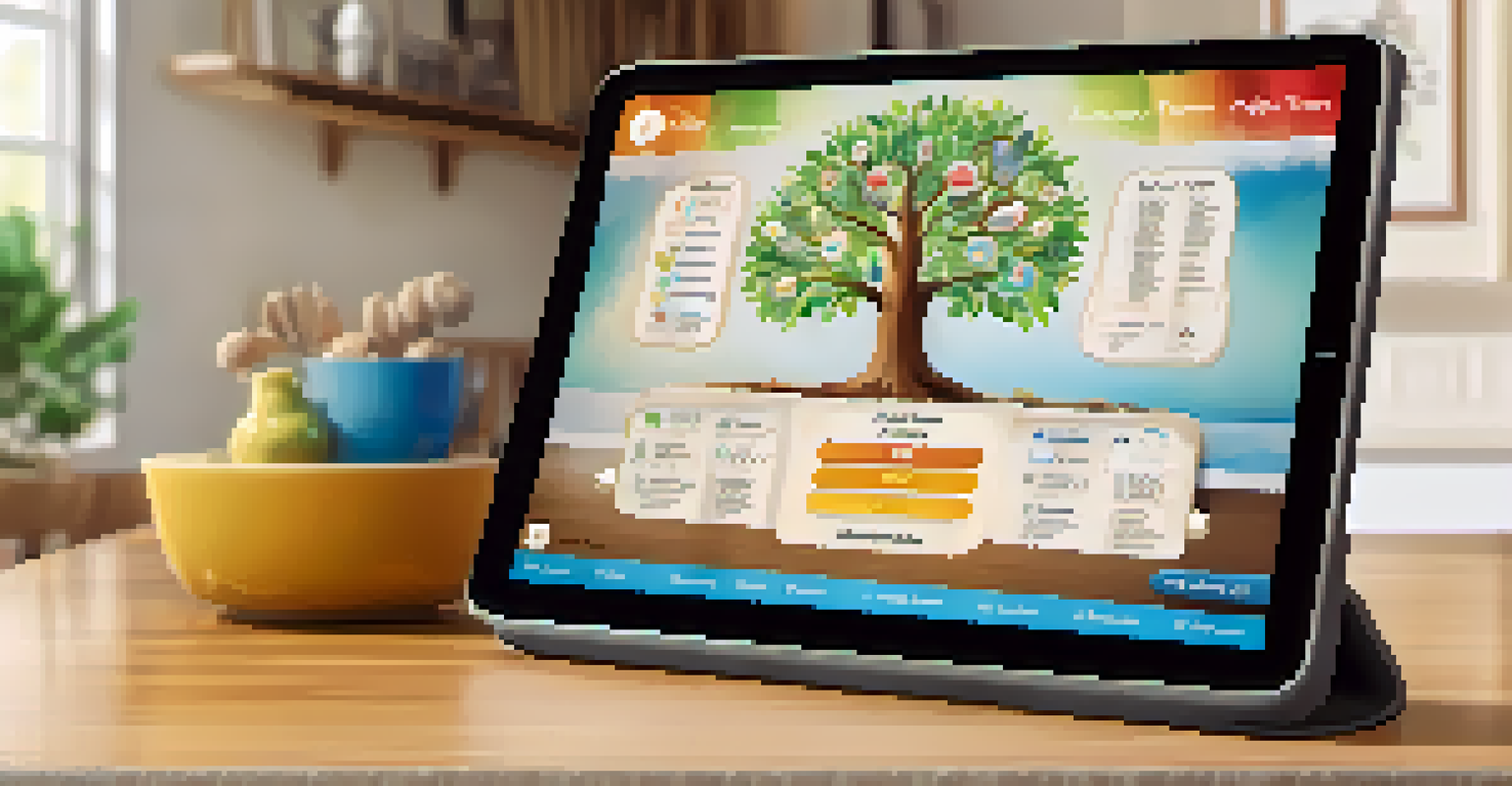The Benefits of Family Health History for Future Generations

What is Family Health History and Why It Matters
Family health history is a record of health information about you and your relatives. It often includes details about illnesses, conditions, and causes of death that have affected family members. Understanding this history can provide powerful insights into potential health risks for future generations.
Knowing your family history can save your life, and the lives of your loved ones.
By compiling this information, families can identify patterns of diseases that may run in their lineage, such as heart disease or diabetes. This knowledge is essential, as it empowers individuals to take preventive measures and seek necessary screenings. Ultimately, it can foster a proactive approach to health, benefiting both current and future family members.
Moreover, having a comprehensive family health history can enhance communication with healthcare providers. When doctors have access to this information, they can offer personalized care and recommend appropriate lifestyle changes or tests. This is especially vital for children and grandchildren, as they can adjust their habits based on what they learn from their family's past.
Identifying Genetic Health Risks for Future Generations
One of the most significant benefits of documenting family health history is the identification of genetic health risks. Certain conditions, like breast cancer or cystic fibrosis, can have hereditary links. By knowing which diseases run in the family, individuals can make informed choices about genetic testing and preventive care.

For instance, if a mother has a history of certain cancers, her children may benefit from early screenings or lifestyle changes to mitigate risks. This proactive approach can lead to early detection and better outcomes. Such awareness can be life-saving, as it allows for tailored health strategies that consider family backgrounds.
Understanding Family Health Risks
Documenting family health history helps identify genetic health risks, empowering individuals to make informed choices about preventive care.
Furthermore, understanding genetic risks can also facilitate discussions about health within families. When relatives share their health histories, it fosters a sense of community and support. This open dialogue encourages everyone to prioritize their health and well-being, leading to a healthier family unit overall.
Promoting Preventive Healthcare Through Family Health Insights
Preventive healthcare is all about taking steps to prevent diseases before they start. By knowing their family's health history, individuals can engage in preventive measures tailored to their specific risks. For instance, someone with a family history of heart disease might adopt a heart-healthy diet and exercise routine.
Family health history is a powerful tool to help us understand our own health and the health of future generations.
Additionally, this knowledge can help families prioritize regular check-ups and screenings. For example, if colon cancer is prevalent in the family, members might begin screenings earlier than the general population recommends. This proactive stance can lead to early intervention and significantly improve health outcomes.
Moreover, understanding family health history can inspire healthier lifestyle choices across generations. Parents who are aware of their family's health risks can instill healthy habits in their children, promoting a culture of wellness. This ripple effect not only benefits immediate family members but also future generations as they inherit these healthy practices.
Enhancing Communication with Healthcare Providers
A well-documented family health history can enhance the quality of communication between patients and their healthcare providers. When patients share their family's health background, doctors can better understand their risk factors and tailor their care accordingly. This collaborative approach fosters a stronger patient-provider relationship.
For example, if a patient reveals that multiple family members have struggled with hypertension, the doctor may recommend lifestyle changes or medications more proactively. This level of personalized care can lead to more effective treatment plans, ensuring that individuals receive the attention they need based on their unique health profiles.
Promoting Preventive Healthcare
Knowledge of family health history encourages proactive health measures, such as early screenings and lifestyle changes tailored to specific risks.
Additionally, clear communication about family health can encourage patients to ask questions and engage in their healthcare actively. When patients feel empowered to share their backgrounds, they become partners in their health journey, leading to better adherence to treatment plans and overall health outcomes.
Creating a Comprehensive Family Health History Document
Creating a family health history document may seem daunting, but it’s a rewarding process. Start by gathering information from immediate family members, including parents, siblings, and grandparents. Documenting illnesses, medical conditions, and age at diagnosis provides a clearer picture of potential risks.
As you collect this information, consider using online tools or templates to organize the data effectively. These resources can guide you in creating a detailed family tree that includes health conditions and any relevant notes. This organized approach ensures that future generations can easily understand their health heritage.
Furthermore, encourage family members to contribute their health stories and updates regularly. This practice keeps the document current and reflects any new health developments. By maintaining an up-to-date family health history, you ensure that future generations have access to valuable insights that can guide their health decisions.
Empowering Future Generations with Health Knowledge
Empowering future generations with health knowledge is one of the most significant advantages of maintaining a family health history. When children and grandchildren understand their family's health risks, they can make informed choices about their lifestyle and healthcare. This awareness can lead to healthier habits and preventive measures that positively impact their lives.
For instance, if a child learns about a family history of diabetes, they might be more inclined to adopt a balanced diet and stay active. This proactive mindset can significantly reduce their risk of developing chronic conditions. The knowledge passed down through generations can foster a culture of health consciousness that lasts.
Leveraging Technology for Tracking
Modern technology provides tools for easily documenting and sharing family health history, enhancing awareness and communication among family members.
Moreover, sharing family health history can strengthen the bond between generations. When grandparents share stories of their health journeys, it creates an opportunity for connection and learning. This not only imparts valuable knowledge but also promotes a sense of responsibility for one's health and well-being.
The Role of Technology in Tracking Family Health History
In today's digital age, technology plays a crucial role in tracking family health history. Numerous apps and online platforms allow families to document health information easily. These tools often come with features that enable users to add notes, update records, and share the information with relatives and healthcare providers.
Using technology can make the process of compiling family health history more engaging and accessible. For example, a family can create a shared document where members contribute their health information, fostering collaboration and awareness. This collective effort ensures that everyone is informed and can take appropriate health measures.

Furthermore, digital records can be easily updated, making it simpler to keep track of changing health situations over time. With the ability to access this information anytime, families can stay informed about their health status and share updates with healthcare professionals as needed. Embracing technology can significantly enhance the effectiveness of managing family health history.